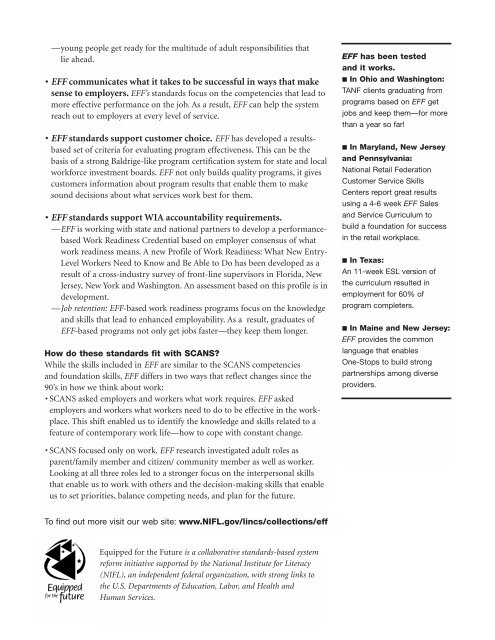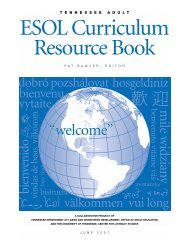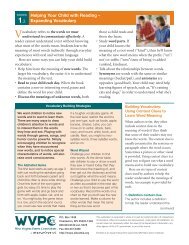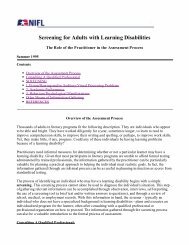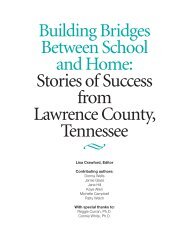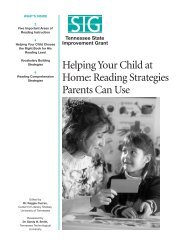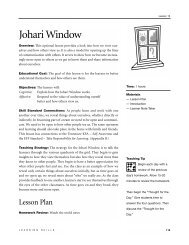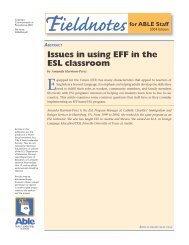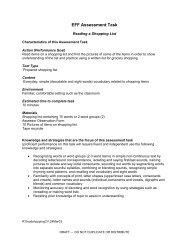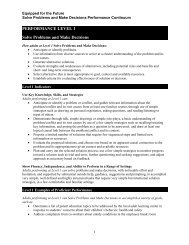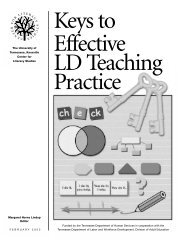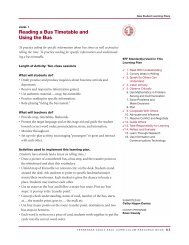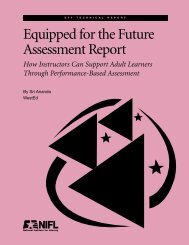Equipped for the Future: 21st Century Skills for the New Economy
Equipped for the Future: 21st Century Skills for the New Economy
Equipped for the Future: 21st Century Skills for the New Economy
Create successful ePaper yourself
Turn your PDF publications into a flip-book with our unique Google optimized e-Paper software.
—young people get ready <strong>for</strong> <strong>the</strong> multitude of adult responsibilities that<br />
lie ahead.<br />
• EFF communicates what it takes to be successful in ways that make<br />
sense to employers. EFF’s standards focus on <strong>the</strong> competencies that lead to<br />
more effective per<strong>for</strong>mance on <strong>the</strong> job. As a result, EFF can help <strong>the</strong> system<br />
reach out to employers at every level of service.<br />
• EFF standards support customer choice. EFF has developed a resultsbased<br />
set of criteria <strong>for</strong> evaluating program effectiveness. This can be <strong>the</strong><br />
basis of a strong Baldrige-like program certification system <strong>for</strong> state and local<br />
work<strong>for</strong>ce investment boards. EFF not only builds quality programs, it gives<br />
customers in<strong>for</strong>mation about program results that enable <strong>the</strong>m to make<br />
sound decisions about what services work best <strong>for</strong> <strong>the</strong>m.<br />
• EFF standards support WIA accountability requirements.<br />
—EFF is working with state and national partners to develop a per<strong>for</strong>mancebased<br />
Work Readiness Credential based on employer consensus of what<br />
work readiness means. A new Profile of Work Readiness: What <strong>New</strong> Entry-<br />
Level Workers Need to Know and Be Able to Do has been developed as a<br />
result of a cross-industry survey of front-line supervisors in Florida, <strong>New</strong><br />
Jersey, <strong>New</strong> York and Washington. An assessment based on this profile is in<br />
development.<br />
—Job retention: EFF-based work readiness programs focus on <strong>the</strong> knowledge<br />
and skills that lead to enhanced employability. As a result, graduates of<br />
EFF-based programs not only get jobs faster—<strong>the</strong>y keep <strong>the</strong>m longer.<br />
How do <strong>the</strong>se standards fit with SCANS?<br />
While <strong>the</strong> skills included in EFF are similar to <strong>the</strong> SCANS competencies<br />
and foundation skills, EFF differs in two ways that reflect changes since <strong>the</strong><br />
90’s in how we think about work:<br />
• SCANS asked employers and workers what work requires. EFF asked<br />
employers and workers what workers need to do to be effective in <strong>the</strong> workplace.<br />
This shift enabled us to identify <strong>the</strong> knowledge and skills related to a<br />
feature of contemporary work life—how to cope with constant change.<br />
EFF has been tested<br />
and it works.<br />
■ In Ohio and Washington:<br />
TANF clients graduating from<br />
programs based on EFF get<br />
jobs and keep <strong>the</strong>m—<strong>for</strong> more<br />
than a year so far!<br />
■ In Maryland, <strong>New</strong> Jersey<br />
and Pennsylvania:<br />
National Retail Federation<br />
Customer Service <strong>Skills</strong><br />
Centers report great results<br />
using a 4-6 week EFF Sales<br />
and Service Curriculum to<br />
build a foundation <strong>for</strong> success<br />
in <strong>the</strong> retail workplace.<br />
■ In Texas:<br />
An 11-week ESL version of<br />
<strong>the</strong> curriculum resulted in<br />
employment <strong>for</strong> 60% of<br />
program completers.<br />
■ In Maine and <strong>New</strong> Jersey:<br />
EFF provides <strong>the</strong> common<br />
language that enables<br />
One-Stops to build strong<br />
partnerships among diverse<br />
providers.<br />
• SCANS focused only on work. EFF research investigated adult roles as<br />
parent/family member and citizen/ community member as well as worker.<br />
Looking at all three roles led to a stronger focus on <strong>the</strong> interpersonal skills<br />
that enable us to work with o<strong>the</strong>rs and <strong>the</strong> decision-making skills that enable<br />
us to set priorities, balance competing needs, and plan <strong>for</strong> <strong>the</strong> future.<br />
To find out more visit our web site: www.NIFL.gov/lincs/collections/eff<br />
<strong>Equipped</strong> <strong>for</strong> <strong>the</strong> <strong>Future</strong> is a collaborative standards-based system<br />
re<strong>for</strong>m initiative supported by <strong>the</strong> National Institute <strong>for</strong> Literacy<br />
(NIFL), an independent federal organization, with strong links to<br />
<strong>the</strong> U.S. Departments of Education, Labor, and Health and<br />
Human Services.


